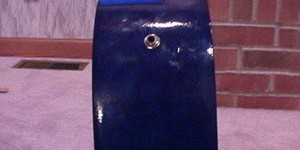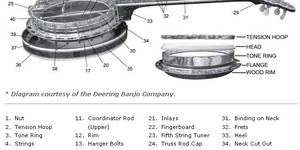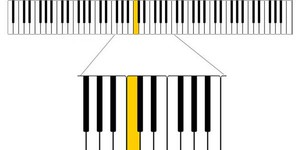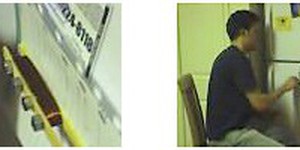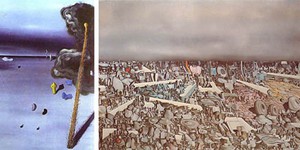Music Science Projects (36 results)
While everyone else is paying attention to what they see, maybe you're focusing on what you can hear. Explore the physics of sound, musical instruments, and even how people respond when they hear music.
|
Select a resource
Sort by
|
In this project you'll learn how to make a piezoelectric pickup for acoustic guitar using inexpensive components. You can then connect your acoustic guitar to an amplifier, and record your own music. If you are interested in electronics and like playing acoustic guitar, this could be the perfect project for you.
Read more
Featured
Have you heard that garlic powder is supposed to inhibit the growth of bacteria? Which do you think would make a better disinfectant: a solution of garlic powder or a solution of bleach? This project shows you a straightforward way to compare the effectiveness of different disinfectants (or other antimicrobial agents), by measuring zones of inhibition on a culture plate.
Read more
The banjo's roots trace all the way over to Africa. The unique sound that a banjo makes depends, in part, on the resonator. The purpose of the resonator is to amplify and project the sound that is made by strumming and plucking the strings. In this music science fair project, you will experiment with a resonator on a banjo and see if you can hear the difference in sound.
Read more
The American holiday of Thanksgiving is a favorite of many. Friends and family getting together, a big feast, fancy china and glassware on the table. Who can resist the temptation to make the wine glasses sing? Find out more about how this works with this project!
Read more
Are there some songs that always make you feel sad when you hear them? How about "Scarborough
Fair," George Gershwin's "Summertime," or the Beatles' "Eleanor Rigby"? All of these songs are in a minor key. Minor keys have more intervals, or halftones, than major keys do. Some musicologists (people who study music) maintain that minor-key songs are more likely to be perceived as sad, while major-key songs are more likely to be interpreted as happy. You can research the competing explanations…
Read more
What is the highest note you can sing? How about the lowest? Do you think males and females can reach the same notes? How about children and adults? Find out the answers to all these questions in this "note"-worthy science fair project!
Read more
If you like playing electric guitar, this could be a cool project for you. Have you ever wondered how an electric guitar works? In this project you'll wind one or more of your own electric guitar pickups and test them out in an inexpensive electric guitar. How will the sound change with the number of turns you use in the coil? Or with the strength of the magnets you use?
Read more
Have you ever bitten into a thick, fragrant casserole and tasted the layers of flavor? Or maybe you've licked of a vanilla ice cream cone and thought, "This is so pure, simple, and refreshing!" These observations about the taste of the food are also comments on its texture—the casserole is complex and thick, and the vanilla ice cream cone is simple and thin. You might not realize it, but sound can also have texture. In this music science fair project, you'll learn how to "taste" the…
Read more
Walk into a fitness club and what kind of music do you hear? Slow, sparkling, relaxing music? Or driving, "up-tempo" songs that are designed to encourage you to move? Fitness clubs and other businesses, like restaurants and grocery stores, use background music to set the mood and to determine how fast they want their customers to move. The tempo of the background music is a key component to the environment that businesses want to create. Tempo is an important number or word inscribed by a…
Read more
Did you know that making a musical instrument is not just an art, but a science, too? You can discover just how scientific by building your own xylophone (or a set of chimes) from copper pipe. First you'll need to do some research about the math and physics involved in the sounds of a xylophone. For example, there are equations that describe the transverse (side-to-side) vibrations of a pipe. These vibrations create the sounds you hear. So, to get specific sounds, xylophone makers must apply…
Read more
Does listening to classical music help or hinder concentration and performance on cognitive tasks? You'll need help from a teacher to design two short, age-appropriate worksheet tests for this experiment. The tests should be of equal difficulty. You'll also need the cooperation of several additional classroom teachers in order to test enough students (at least 50-100, see the Science Buddies resource: How Many Participants Do I Need?). Half the students will take test A while listening to…
Read more
|
Explore Our Science Videos
DIY Mini Drone Part 7: Automatic Balancing
Squishy Circuits Classroom Activity Part 1
Make a Lung Model – STEM activity


